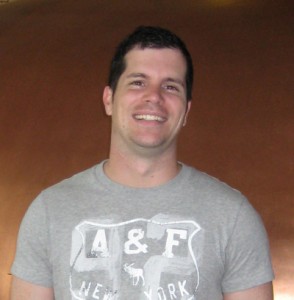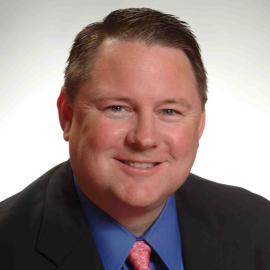
Jonathan Morgan, BHP ’98, had his mind made up while in school to move to New York and work in investment banking. A BHP and Finance major, Morgan is now Principal at Brown Bear Capital in New York City. His path to the Big Apple included stops in Asia, Europe, and Wharton, as well as many valuable lessons along the way. We sat down with him to learn more about his career path.
Talk a little bit about Brown Bear Capital Management and your role there?
Brown Bear Capital Management manages a $100M hedge fund. We are a small shop, with only three people. The company launched in 2008 with 10 investors. I came on in 2009 to serve as lead analyst and trader. I mainly cover industrial companies and invest across the capital structure (credit and equity) looking for cheap or expensive securities. Most large funds have separate research analysts and traders, so my position now is a hybrid where I do both.
What has it been like transitioning to a small shop?
There are positives and negatives. I have more bandwidth in a smaller shop. I have learned a lot and it is easy to get the boss’s attention. What I suggest is done, as opposed to my last position, where everyone was trying to get time in front of the decision makers. As a small fund though, you don’t get as much attention from Wall Street. At a big fund you are invited to more conferences and meetings with bank analysts and company management. We don’t do as many trades, so it is more difficult to get their attention. The resources are a lot less as well. I have to wear more hats and work on the business as well as everything else. At this point in my career though, it is good because it is hands-on experience for how to run my own shop if I want to go down that road in the future.
What was your career path leading up to your current position?
I majored in BHP and Finance. Pretty early on I decided I wanted to go to New York and do investment banking. I had some offers with big companies, but I ended up going directly to a private equity shop in Dallas called Lone Star Funds. A good friend of mine from BHP had gotten me an internship there, and they ended up offering me a job. They were a small fund at the time managing about $400 million. They have grown significantly since then and now manage $33 billion. I was with them for five years. At the time, 80% of their business was in Asia. I mainly worked with real estate investments and company buy-outs. I went to Korea for two years to look at new deals, oversee the due diligence process, and oversee the asset managers. I then went to Europe for a while.
After that, I went to get my MBA at Wharton. Shortly after graduation I moved to New York and went to work for Avenue Capital Group, a large high-yield credit fund. It was a big move to go from private equity to a hedge fund in public markets. I worked for the European fund and spent lots of my time in Europe buying corporate bonds for companies that are likely to default or had already. It was a typical Wall Street experience. I worked there for a couple years and learned a lot about securities trading and got sector experience. I learned how to look at company structure and see what is attractive and what isn’t.
From there I went to One East Partners, a fund launched in 2006. I joined about 6 months after it launched. It was a newer fund and I was only the fifth analyst hired, so it was a bit of a gamble. I was making a bet that they would be able to grow the fund. Unfortunately, they took a hit in 2009 and were down about twenty percent like everyone else. Because they were a newer fund, they had trouble rebounding. I left about that time to join Brown Bear.
What was daily life like in these jobs?
When I was in Korea, we had a lot of strict deadlines, so I was working some all-nighters and at one point worked 45 consecutive days. So in many ways it was similar to the hours a typical I-bank analyst would work. With hedge funds, it isn’t as deadline intense, so I was actually working less hours. Hedge fund hours are pretty much 60 hours a week normally. That said, there are times when it is a high pressure environment and you are working at a fast pace in a very intense environment.
What skills have you found particularly valuable when making trading decisions?
Having a broad understanding of accounting and finance is very important. Intermediate accounting was one of the most useful classes I took. I think students need to go beyond what they learn in the classroom and figure out how they can apply it. When they interview for investment banking, they will be competing with grads from ivy-league schools, which don’t have undergraduate business programs. When companies see that a student went to UT, they are going to ask them accounting and finance questions since they should have that background. They need to be ready to answer those questions. They should be able to look at a company’s financial statements and break them apart.
Many BHP students find Texas jobs easier to come by than NYC positions. As a BHP alum in NYC, what advice do you have for students who really want to work in the Big Apple?
When you are a sophomore or junior, start figuring out where you want to go and how you are going to get there. Ask the people who are recruiting what stands out on a resume so that you can get the interview. Tailor your resume to what the companies are looking for. That goes for applying to MBA programs too. The BHP alumni network really helped me and got me my first job. I kept in touch with my classmates who went into investment banking and networked with them so they could help me. I also think getting an internship in New York will help a lot. Find companies that have UT alums because they will value the UT brand. Also, have a good reason why you want to work in NYC because recruiters may ask that.
Reflecting back on your time at UT, was there anything you would have done differently?
I would have taken advantage of the greater UT community. I would have taken classes in stuff I didn’t maybe have an interest in to expose myself to it. I was very tied to the business school and wish that I would have done more outside of it, like taking on a minor in something else, or joining some other clubs. Anything you can do to broaden your experience outside of business will set you apart from others and enrich your college life. I also wish I had spent more time exploring Austin.
Is there anything else you would like to add?
Be willing to take risks. When I joined Lone Star, it was a risk. I turned down some of the bigger banks and took a chance. Working for them gave me the opportunity to live in other places, which was a great experience. Be very comfortable with who you are working for. Working for the right boss, who is invested in helping you grow, is very important. Ask who you will be reporting to, because that is huge.
 Lynn Utter, COO of Knoll, Inc. and Director of Wesco International, Inc. came last Wednesday to speak at the sophomore lyceum course. Through her back-and-forth banter with Dr. Prentice, the former ERB BHP alum enthralled students with humorous anecdotes and words of wisdom learned from her prolific business career.
Lynn Utter, COO of Knoll, Inc. and Director of Wesco International, Inc. came last Wednesday to speak at the sophomore lyceum course. Through her back-and-forth banter with Dr. Prentice, the former ERB BHP alum enthralled students with humorous anecdotes and words of wisdom learned from her prolific business career.

